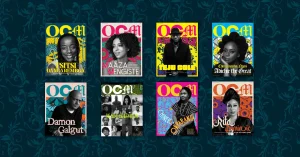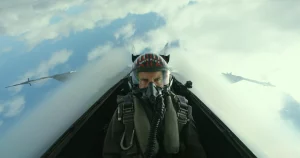I was 13 when I fell in love with the whole of Didier Drogba. I had freshly become a football follower, a stubborn Chelsea fan. This was 2007, the age of newspapers and magazines, before browsing phones spread and newspaper stand crowds thinned and KickOff and SoccerStar made way for Goal.com. I was building stacks of football newspapers and magazines, but it was in a politics newspaper, in its sports spread, that I read the first football profile I really liked. It was titled “DD: Deadly Drogba,” and ran with a black-and-white photo of the striker and his braided hair, his left or right foot in pursuit of the ball in the air, his shorts drawn back to reveal his thighs, full.
I wish I could say that it began with that profile, that photo, but it began months before, in late 2006. My classmates had spent the previous year talking about and talking down on this team with loud, uncouth supporters who thought they could buy players and buy their way to trophies. Afterwards, by chance, I had watched a Chelsea match and seen Frank Lampard and began calling myself a Chelsea fan, and then, because my classmates kept talking about him and didn’t like him because he scored against Nigeria in that year’s African Nations Cup, I took faint interest in Drogba. It must have started then. Early 2007, maybe March, maybe April, I remember a senior whose nickname was Drogba coming into our class, standing at the door, arms raised, a wide smile on his face, saying, “Drogba na, Drogba won, Essien came second.” I didn’t like Senior Drogba; I really did not like Senior Drogba, but in that moment that he stood there, the joy in his body radiant, I was infected. Afterwards, I saw a newspaper report of his role in negotiating the end of the civil war in his home country of Cote d’Ivoire: that in October 2005, after Cote d’Ivoire had qualified for the 2006 World Cup, he picked a microphone in their dressing room and knelt down, surrounded by his teammates, and pleaded with both sides to lay down their arms. He was larger than life. That might have been when I fell in love with the first person I didn’t know personally.
Watching Drogba on the pitch, watching him move and run, him jump and nod, watching his control of the ball with his chest, his perfection of the “turn and shoot” technique, was a drug. The loudest thing I liked about him was that he was brutal, beastly. Before him, the only other footballer I’d seen instill such fear, exert such dominance of defenders, was Ricardo Kaka, in the two legs of his AC Milan’s Champions’ League semifinals against Manchester United: I’d watched Kaka’s killing laughing, fearing, laughing because it was Manchester United suffering and I didn’t like Manchester United, fearing because AC Milan might be meeting Chelsea if Chelsea won their own bout and I didn’t think Chelsea could survive them. It didn’t happen: Chelsea fell to Liverpool and I watched Drogba walk off the pitch annoyed. It might have been that annoyance, refined now, rechanneled now, that he wore on his body like grace when he tore into Liverpool the following season, 2007/2008, scoring twice at Stamford Bridge to take us into the final. But in that final, against Manchester United, we fell short. I didn’t watch the match: I was in SS1 then and didn’t fancy scaling our school fence at night to watch it in some bar surrounded by palm wine and the wining of men. But it was glorious, I felt its glory, because my classmates who watched it came back bedazzled. Drogba slapped Nemanja Vidic and was sent off. John Terry, captain, leader, legend, took the fifth penalty that would have been Drogba’s and slipped and the ball hit the post. Nicolas Anelka missed his and we lost. I felt sore for Drogba. The English media were on his case: would he leave Chelsea? To AC Milan? Real Madrid? Would he rejoin Jose Mourinho at Inter Milan. As the speculation grew, I worried: could I still remain a Chelsea fan if Drogba left? Because my love for Drogba was stronger than my love for Chelsea.
He stayed.
In 2009, Barcelona beat us in the Champions’ League semifinals and, because we were robbed, all those injury time penalty calls none of which were given, Drogba faced the camera and said, “This is a fucking disgrace,” and was banned by UEFA for some matches. I had begun to like Barcelona then, Lionel Messi in particular, but I was angry. WTF! In 2009/10, Drogba won the Premier League’s Golden Boot, his second, and among his 29 goals, I remember and enjoyed most his battering of Arsenal, that winless club whose fans, with their ability to faithfully endure in the absence of a confident future, I’d always been intrigued by. In 2010/2011, Fernando Torres came, and flopping followed, and Drogba stayed. In 2011/2012, he was back to his beastly best. Napoli fell in the Round of 16, and Barcelona in the semifinals, and Bayern Munich in the final. Drogba powered in the 88th minute equalizer and scored the decisive penalty. It was his crowning moment. It was my sating moment. Chelsea had finally won the Champions’ League.
After that year, my watching of football waned, partly because I had found a new interest, literature, and football, the first in a line of interests that would make way in my life for another, took a back seat.
There was my liking of Drogba’s suits, his shirts, jeans, the way he dressed. The way he spoke. His natural charisma. His exemplification of that quality I instantly like in people: drive. Drogba did not have the natural talent of many of his peers but he worked hard, becoming one of the most effective freekick-takers of his set. He was CAF African Footballer of the Year twice, for 2006 and 2009, and I think he should have further won for 2007 and 2010—the first going to Frederic Kanoute because, as reports rumoured then, CAF officials had called to congratulate Drogba but, due to commitments with the Cote d’Ivoire team, he sent his wife rather than show up to the ceremony; the second going to Samuel Eto’o.
Weeks ago, Didier Drogba retired from football. Watching him had been one of the joys of my life. There has been no other like him. There will be no other that I will love with the same enthrallment—his feet, his head. He’s bald now and I love it.
Image from Independent.co.uk.



5 thoughts on “The Feet of Drogba”
He changed the way I viewed soccer players of Afrikan origin – it was the meaning I attached to the hairstyles he wore.
Now that you’ve said it — absolutely. He defined the idea of an African footballer.
Dude did magic that resonates in one’s memory. When Chelsea don’t do well, like last season, I always thought of the miracle, the beast in Drogba’s legs.
.
He has written his name too well to be cleaned.
That line — too well to be cleaned.
He was denied two recognitions. He bullied defenders and wowed you. He halted, or contributed tremendously, in halting the civil war in his country. He was charismatic. He is bald now and you love it.
I disliked Drogba because I had sto dislike Drogba(laughs), but this article, this celebration of him, is music. It can also be titled “Ode to the Balding Legend of Our Time.”
Well done, man. I an addicted to your ornamental, lyrical prose.